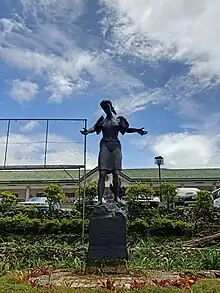University of the Philippines Baguio
The University of the Philippines Baguio (UPB; Filipino: Unibersidad ng Pilipinas Baguio), also referred to as UP in the North[2] or UP Baguio, is a public research university located in Baguio, Philippines. It was established in 1921 through the initiative of UP alumni in Baguio and Benguet and was inaugurated as the UP College of Baguio on April 22, 1961.[3] It was eventually elevated to its present autonomous status as a constituent university on December 2, 2002.[3]
Unibersidad ng Pilipinas Baguio | |
 University seal of UP Baguio | |
| Motto | Honor and Excellence |
|---|---|
| Type | Public state university, research university |
| Established | 1921 (as Vigan extension campus of the UP College of Liberal Arts) 1938 (transfer to Baguio) 1961 (as branch campus of UP Diliman) 2002 (UP Baguio) |
Academic affiliations | APRU ASAIHL ASEA UNINET AUN |
| Chancellor | Corazon L. Abansi |
| President | Angelo Jimenez |
Academic staff | 143 (2013)[1] |
| Students | 2,766 (March 2023) |
| Undergraduates | 2,432 (March 2023) |
| Postgraduates | 334 (March 2023) |
| Location | 16.405145°N 120.597932°E |
| Hymn | "U.P. Naming Mahal" ("U.P. Our Beloved") |
| Colors | Maroon |
| Nickname | Fighting Maroons |
Sporting affiliations | BBEAL |
| Website | upb.edu.ph |
It is the seventh constituent university of the University of the Philippines System[4] and is the university's flag-bearer in Northern Luzon.[2] It is also one of the research institutions in the region through its Cordillera Studies Center, with ethnic and interdisciplinary research[5] as well as for its efforts in conserving the biodiversity and indigenous cultures of the Cordillera Region.[6]
Being a former extension of the UP College of Liberal Arts, UP Baguio mainly specializes in the sciences, arts and humanities.[7] It currently offers 16 academic programs through its three degree-granting units.[8] As of 2019, the Commission on Higher Education (CHED) has accredited three academic programs in the university as Centers of Development, namely in the fields of biology, mathematics, and physics.[9]
History

The university was initially established in 1921 as an extension of the UP College of Liberal Arts, and was originally located in Vigan, Ilocos Sur.[2][10] In 1938, it was relocated to Baguio as the UP College of Arts and Sciences.[2][4]
During World War II, the buildings and facilities within the college were largely destroyed, and reestablishment efforts were immediately carried out by UP alumni after the war.[2][4] After several years since its post-war restoration, the college then became a branch campus of UP Diliman, becoming known as the UP College of Baguio on April 22, 1961.
On December 2, 2002, the university's distinction was affirmed by the elevation of the UP College of Baguio into a constituent university through a unanimous endorsement by the UP Board of Regents (BOR), in which it became officially known as UP Baguio.[2][4]
Organization and administration
| Chancellors of the University of the Philippines Baguio |
| Dr. Priscilla Supnet Macasantos, 2003–2012 |
| Dr. Raymundo D. Rovillos, 2012–2021 |
| Dr. Corazon L. Abansi, 2021–present |
UP Baguio is governed by the university system's 11-member Board of Regents. Like all other UP campuses, UP Baguio is headed and supervised by a chancellor, who is assisted by two vice chancellors—one for academic affairs and the other for administration.[11] The first chancellor of UP Baguio was Dr. Priscilla Supnet Macasantos, who oversaw the campus' elevation into a constituent university of UP within her term.[4] The current chancellor selected by the Board of Regents is Dr. Corazon L. Abansi, who succeeded Dr. Raymundo Rovillos after his term ended on April 13, 2021.[12]
The University of the Philippines Baguio is an affiliate of the following associations:
Academics
Admissions
Admission to the university is highly selective. Students who wish to enter the university must first pass the University of the Philippines College Admission Test (UPCAT), which serves as an admission requirement for all constituent units of the university system.[8]
| Unit | Foundation | Notes |
|---|---|---|
| College of Arts and Communication | 2002 | [13] |
| College of Science | 2002 | [14] |
| College of Social Sciences | 2002 | [15] |
Degree-granting units
UP Baguio constitutes three colleges as its academic arms, which are headed by their respective deans. On the other hand, the Institute of Management―which is part of the College of Social Sciences―is headed by a director, while the Human Kinetics Program―which is part of the College of Science―is led by a coordinator.[2][4] and offers 11 undergraduate degree programs, 8 graduate degree programs, and a pre-baccalaureate certificate program.[8]
These programs are the following:
1. Undergraduate Programs:
- Bachelor of Science in Biology (concentrations in either General Biology, Ecology and Systematics, or Microbiology)
- Bachelor of Science in Computer Science
- Bachelor of Science in Mathematics
- Bachelor of Science in Physics
- Bachelor of Arts in Communication (concentrations and minors in either Journalism, Broadcast Communication, or Speech Communication)
- Bachelor’s in Fine Arts (concentration in Visual Arts)
- Bachelor of Arts in Language and Literature
- Bachelor of Arts in Social Sciences (Anthropology)*
- Bachelor of Arts in Social Sciences (Economics)*
- Bachelor of Arts in Social Sciences (History)*
- Bachelor of Science in Management Economics
- - may minor in either Sociology, Political Science, Psychology, or Philosophy
2. Graduate Programs:
- Master of Science in Conservation and Restoration Ecology
- Master of Science in Mathematics
- Doctor of Philosophy in Mathematics
- Master of Arts in Language and Literature
- Master of Arts in History (Ethnohistory and Local History)
- Doctor of Philosophy in Indigenous Studies
- Master of Arts in Social and Development Studies
- Master of Management
3. Pre-Baccalaureate Program:
- Certificate in Fine Arts
The university has been identified by CHED as a Center of Development in biology, mathematics, and physics since 2001.[2][16]
Rankings and Reputation
The UP System, which UP Baguio is a part of, has been consistently ranked the top university in the Philippines since its inclusion in several university rankings.
UP Baguio, as part of the UP system, specializes in the Social Sciences — particularly in Indigenous Studies as well as Cordilleran and Northern Luzon history and culture.
UP Baguio is also internationally known for the Cordillera Review Center, which produces ethnic and interdisciplinary articles and journals — arguably making it one of the primary institutions in Northern Luzon and the Cordilleras. The constituent university is also known for the Cordillera Review, a peer-reviewed journal that features researches about the Cordilleras and Northern Luzon.[10]
Gallery
(2018-11-26).jpg.webp) Oblation Monument
Oblation Monument Administration Hall Lobby (Iskolar ng Bayan Hall)
Administration Hall Lobby (Iskolar ng Bayan Hall) Welcome logo of UP Baguio
Welcome logo of UP Baguio Museo Kordilyera
Museo Kordilyera Teatro Amianan
Teatro Amianan CordiTex
CordiTex Abortion Stairs
Abortion Stairs Kiosk
Kiosk
See also
- State Universities and Colleges (Philippines)
- List of University of the Philippines people
- University of the Philippines
- University of the Philippines Manila
- University of the Philippines Los Banos
- University of the Philippines Diliman
- University of the Philippines Cebu
- University of the Philippines Visayas
- University of the Philippines Mindanao
- University of the Philippines Open University
References
- "U.P. Statistics 2013" (PDF). University of the Philippines. University of the Philippines system. 2013. Archived from the original (PDF) on August 25, 2014. Retrieved April 26, 2015.
- "Resilient Campus Plan – UP Baguio". Archived from the original on December 5, 2020. Retrieved November 27, 2020.
- "Baguio Midland Courier Website". www.baguiomidlandcourier.com.ph. Archived from the original on June 19, 2009. Retrieved November 28, 2020.
- "QS University Rankings: Asia 2021". Top Universities. November 26, 2020. Archived from the original on October 24, 2018. Retrieved November 26, 2020.
- University of the Philippines Baguio. "Research". upb.edu.ph. Archived from the original on August 12, 2022. Retrieved November 30, 2020.
- Villanueva, Cristina (June 12, 2013). "Preserving Cordillera culture and history through the University of the Philippines Baguio Cordillera Studies Collection Library and UP Baguio Cordillera/Northern Luzon Historical Archives" (PDF). International Federation of Library Associations and Institutions (IFLA). Archived (PDF) from the original on June 14, 2021. Retrieved December 2, 2020.
- "Student Exchange Information - UNIVERSITY OF THE PHILIPPINES" (PDF). University of Tokyo. Archived (PDF) from the original on August 24, 2022. Retrieved December 2, 2020.
- "University of the Philippines Baguio - Academic Catalogue 2019" (PDF). University of the Philippines Baguio. Archived (PDF) from the original on December 7, 2022. Retrieved April 5, 2021.
- "Extension of the Validity Period of Designated Centers of Excellence (COEs) and Centers of Development (CODs) for Various Disciplines" (PDF). The Official Website of the Commission on Higher Education. Archived (PDF) from the original on August 6, 2022. Retrieved December 4, 2020.
- UPB-SysNet. "University of the Philippines Baguio". upb.edu.ph. Archived from the original on August 12, 2022. Retrieved November 27, 2020.
- "Administrative Reports". University of the Philippines Baguio. Archived from the original on April 4, 2022. Retrieved April 6, 2021.
- "Dr. Abansi is the new UP Baguio Chancellor". University of the Philippines Baguio. Archived from the original on June 23, 2021. Retrieved April 6, 2021.
- University of the Philippines Baguio. "College of Arts and Communication". cac.upb.edu.ph. Archived from the original on October 12, 2022. Retrieved November 30, 2020.
- University of the Philippines Baguio. "College of Science". cs.upb.edu.ph. Archived from the original on December 7, 2022. Retrieved November 30, 2020.
- University of the Philippines Baguio. "College of Social Sciences". css.upb.edu.ph. Archived from the original on September 5, 2017. Retrieved November 30, 2020.
- "List of Centers of Excellence and Development" (PDF). CHED - The Official Website of the Commission on Higher Education. Archived (PDF) from the original on August 20, 2020. Retrieved December 2, 2020.